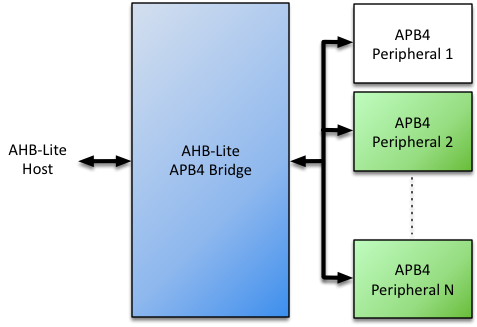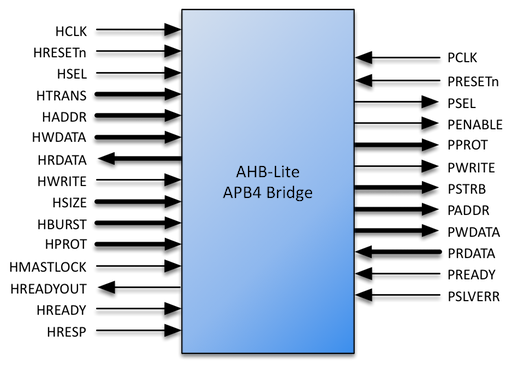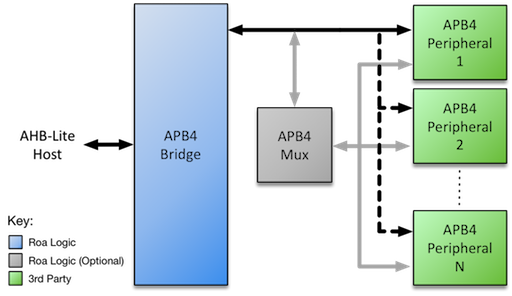AHB-Lite to APB Bridge
Parameterised Asynchronous AHB-Lite to APB Bridge
License Terms:
Non-Commercial License
This project is maintained by:
RoaLogic
AHB-Lite APB4 Bridge Datasheet
Contents
Introduction
The Roa Logic AHB-Lite APB4 Bridge is a fully parameterized soft IP interconnect bridge between the AMBA 3 AHB-Lite v1.0 and AMBA APB v2.0 bus protocols.
The AHB-Lite APB4 Bridge natively supports a single peripheral, however multiple APB4 peripherals may be connected to a single bridge by including supporting multiplexer logic – See the AMBA APB v2.0 Protocol specification. An APB4 Multiplexer IP implementing this capability is available from Roa Logic

Features
-
Full support for AMBA 3 AHB-Lite and APB version 2.0 (APB4) protocol
-
Fully parameterized
-
Unlimited APB4 address and data widths supported
-
Configurable number of peripheral-side byte lanes with automatic handling of burst transfers
-
Support for separate clock domain per interface with automatic handling of cross-domain timing.
Specifications
Functional Description
The Roa Logic AHB-Lite APB4 Bridge is a highly configurable, fully parameterized soft IP interconnect bridge between the AMBA 3 AHB-Lite v1.0 and AMBA APB v2.0 bus protocols.
These protocols are commonly referred to as AHB-Lite and APB4 respectively – these terms will be used throughout this datasheet. All signals defined in the AHB-Lite and APB4 specifications are fully supported.
The IP contains 2 interfaces; an AHB-Lite Slave Interface and an APB4 Master Interface. Transactions received on the AHB-Lite Slave Interface are translated into APB4 transactions on the APB4 Master Interface. The IP automatically generates APB4 burst transactions if the APB4 data width is less than the AHB-Lite data width.

Each interface can operate on a separate clock domain and the IP automatically handles all cross clock domain synchronization requirements.
| Notes: | |
|---|---|
| 1. | The APB4 Interface clock frequency must be less than or equal to the AHB-Lite interface clock frequency |
| 2. | The APB4 Interface data width must be less than or equal to the data width of the AHB-Lite interface |
| 3. | AHB-Lite and APB4 Interface data widths must be an integer multiple of bytes. |
AHB-Lite Interface
An AHB-Lite Bus Master connects to the AHB interface of the AHB-Lite APB4 Bridge. The AHB interface is implemented as a regular AHB-Lite Slave Interface, supporting all signals in the AMBA 3 AHB-Lite v1.0 protocol specification
APB4 Interface
An APB4 Bus Slave connects to the APB interface of the Bridge IP. The APB port is implemented as a regular APB4 Master Interface supporting all signals of the AMBA APB v2.0 protocol specification. This allows a single APB4 Peripheral to be connected directly to the Interface without further logic requirements.
Multiple peripherals can share the APB4 Interface through appropriate decoding and multiplexing of the interface signals. Roa Logic provides an additional APB4 Multiplexer IP to implement this capability.

Configurations
Introduction
The Roa Logic AHB-Lite APB4 Bridge is a fully configurable bridge IP to enable AHB-Lite based hosts to communicate with APB4 based peripherals. The core parameters and configuration options are described in this section.
Core Parameters
| Parameter | Type | Default | Description |
|---|---|---|---|
HADDR_SIZE |
Integer | 32 | AHB-Lite Address Bus Size |
HDATA_SIZE |
Integer | 32 | AHB-Lite Data Bus Size |
PADDR_SIZE |
Integer | 10 | APB4 Address Bus Size |
PDATA_SIZE |
Integer | 8 | APB4 Data Bus Size |
SYNC_DEPTH |
Integer | 3 | Clock Domain Crossing Sync Stages |
HADDR_SIZE
The HADDR_SIZE parameter specifies the width of the address bus for the AHB-Lite interface.
HDATA_SIZE
The HDATA_SIZE parameter specifies the width of the data bus for the AHB-Lite interface. This parameter must equal an integer multiple of bytes and also be greater or equal to PDATA_SIZE:
| Conditions: | |
|---|---|
| 1. | HDATA_SIZE ≥ PDATA_SIZE |
| 2. | HDATA_SIZE MOD 8 = 0 |
PADDR_SIZE
The PADDR_SIZE parameter specifies the width of the address bus for the APB4 (i.e. peripheral) interface.
PDATA_SIZE
The PDATA_SIZE parameter specifies the width of the data bus for APB4 (i.e. peripheral) interface. This parameter must equal an integer multiple of bytes and also be less than or equal to HDATA_SIZE.
| Conditions: | |
|---|---|
| 1. | PDATA_SIZE ≤ HDATA_SIZE |
| 2. | PDATA_SIZE MOD 8 = 0 |
SYNC_DEPTH
The APB4 Bridge IP supports operating the AHB-Lite and APB4 interfaces in separate, unrelated clock domains. The IP automatically handles cross-domain synchronization and the SYNC_DEPTH parameter determines the number of synchronization stages between these clock domains.
Increasing this parameter reduces the possibility of metastability for signals crossing between the two domains, but at the cost of increased latency.
The minimum and default value of the SYNC_DEPTH parameter is 3.
Limits to APB4 Address & Data Sizes
The AMBA APB v2.0 Protocol specification limits the widths of both Address (PADDR_SIZE) and Data (PDATA_SIZE) buses to 32 bits. However the AHB-Lite APB4 Bridge IP Address and Data sizes are not similarly constrained – any Address width and any byte-aligned Data width is supported by the IP.
Interfaces
AHB-Lite Interface
The AHB-Lite interface is a regular AHB-Lite slave port. All signals are supported. See the AMBA 3 AHB-Lite Specification for a complete description of the signals.
| Port | Size | Direction | Description |
|---|---|---|---|
HRESETn |
1 | Input | Asynchronous active low reset |
HCLK |
1 | Input | Clock Input |
HSEL |
1 | Input | Bus Select |
HTRANS |
2 | Input | Transfer Type |
HADDR |
HADDR_SIZE |
Input | Address Bus |
HWDATA |
HDATA_SIZE |
Input | Write Data Bus |
HRDATA |
HDATA_SIZE |
Output | Read Data Bus |
HWRITE |
1 | Input | Write Select |
HSIZE |
3 | Input | Transfer Size |
HBURST |
3 | Input | Transfer Burst Size |
HPROT |
4 | Input | Transfer Protection Level |
HREADYOUT |
1 | Output | Transfer Ready Output |
HREADY |
1 | Input | Transfer Ready Input |
HRESP |
1 | Output | Transfer Response |
HRESETn
When the active low asynchronous HRESETn input is asserted (‘0’), the interface is put into its initial reset state.
HCLK
HCLK is the interface system clock. All internal logic for the AHB-Lite interface operates at the rising edge of this system clock and AHB bus timings are related to the rising edge of HCLK.
HSEL
The AHB-Lite interface only responds to other signals on its bus – with the exception of the global asynchronous reset signal HRESETn – when HSEL is asserted (‘1’). When HSEL is negated (‘0’) the interface considers the bus IDLE.
HTRANS
HTRANS indicates the type of the current transfer as shown in Table [tab:HTRANS]
HTRANS |
Type | Description |
|---|---|---|
00 |
IDLE |
No transfer required |
01 |
BUSY |
Connected master is not ready to accept data, but intents to continue the current burst. |
10 |
NONSEQ |
First transfer of a burst or a single transfer |
11 |
SEQ |
Remaining transfers of a burst |
HADDR
HADDR is the address bus. Its size is determined by the HADDR_SIZE parameter and is driven to the connected peripheral.
HWDATA
HWDATA is the write data bus. Its size is determined by the HDATA_SIZE parameter and is driven to the connected peripheral.
HRDATA
HRDATA is the read data bus. Its size is determined by the HDATA_SIZE parameter and is sourced by the connected peripheral.
HWRITE
HWRITE is the read/write signal. HWRITE asserted (‘1’) indicates a write transfer.
HSIZE
HSIZE indicates the size of the current transfer as shown in table [tab:HSIZE]:
HSIZE |
Size | Description |
|---|---|---|
000 |
8 bit | Byte |
001 |
16 bit | Half Word |
010 |
32 bit | Word |
011 |
64 bits | Double Word |
100 |
128 bit | |
101 |
256 bit | |
110 |
512 bit | |
111 |
1024 bit |
HBURST
HBURST indicates the transaction burst type – a single transfer or part of a burst.
HBURST |
Type | Description |
|---|---|---|
000 |
SINGLE |
Single access** |
001 |
INCR |
Continuous incremental burst |
010 |
WRAP4 |
4-beat wrapping burst |
011 |
INCR4 |
4-beat incrementing burst |
100 |
WRAP8 |
8-beat wrapping burst |
101 |
INCR8 |
8-beat incrementing burst |
110 |
WRAP16 |
16-beat wrapping burst |
111 |
INCR16 |
16-beat incrementing burst |
HPROT
The HPROT signals provide additional information about the bus transfer and are intended to implement a level of protection.
| Bit# | Value | Description |
|---|---|---|
| 3 | 1 | Cacheable region addressed |
| 0 | Non-cacheable region addressed | |
| 2 | 1 | Bufferable |
| 0 | Non-bufferable | |
| 1 | 1 | Privileged Access |
| 0 | User Access | |
| 0 | 1 | Data Access |
| 0 | Opcode fetch |
HREADYOUT
HREADYOUT indicates that the current transfer has finished. Note, for the AHB-Lite PLIC this signal is constantly asserted as the core is always ready for data access.
HREADY
HREADY indicates whether or not the addressed peripheral is ready to transfer data. When HREADY is negated (‘0’) the peripheral is not ready, forcing wait states. When HREADY is asserted (‘1’) the peripheral is ready and the transfer completed.
HRESP
HRESP is the instruction transfer response and indicates OKAY (‘0’) or ERROR (‘1’).
APB4 (Peripheral) Interface
The APB4Interface is a regular APB4 Master Interface. All signals defined in the protocol are supported as described below. See the AMBA APB Protocol v2.0 Specifications for a complete description of the signals.
| Port | Size | Direction | Description |
|---|---|---|---|
PRESETn |
1 | Input | Asynchronous active low reset |
PCLK |
1 | Input | Clock Input |
PSEL |
1 | Output | Peripheral Select |
PENABLE |
1 | Output | Peripheral Enable Control |
PPROT |
3 | Output | Transfer Protection Level |
PWRITE |
1 | Output | Write Select |
PSTRB |
PDATA_SIZE/8 |
Output | Byte Lane Indicator |
PADDR |
PADDR_SIZE |
Output | Address Bus |
PWDATA |
PDATA_SIZE |
Output | Write Data Bus |
PRDATA |
PDATA_SIZE |
Input | Read Data Bus |
PREADY |
1 | Input | Transfer Ready Input |
PSLVERR |
1 | Input | Transfer Error Indicator |
PRESETn
When the active low asynchronous PRESETn input is asserted (‘0’), the APB4 interface is put into its initial reset state.
PCLK
PCLK is the APB4 interface system clock. All internal logic for the APB4 interface operates at the rising edge of this system clock and APB4 bus timings are related to the rising edge of PCLK.
The frequency of PCLK must be less than or equal to that of the AHB-Lite Interface clock HCLK:
| Conditions: | |
|---|---|
Freq( PCLK ) ≤ Freq( HCLK ) |
PSEL
The APB4 Bridge generates PSEL, signaling to an attached peripheral that it is selected and a data transfer is pending.
| Note: | |
|---|---|
To support multiple APB4 peripherals, individual PSEL signals must be generated per peripheral - Roa Logic provides an additional APB4 Multiplexer IP to support this requirement |
PENABLE
The APB4 Bridge asserts PENABLE during the second and subsequent cycles of an APB4 data transfer.
PPROT
PPROT[2:0] indicates the protection type of the data transfer, with 3 levels of protection supported as follows:
| Bit# | Value | Description |
|---|---|---|
| 2 | 1 | Instruction Access |
| 0 | Data Access | |
| 1 | 1 | Non-Secure Access |
| 0 | Secure Access | |
| 0 | 1 | Privileged Access |
| 0 | Normal Access |
PWRITE
PWRITE indicates a data write access when asserted high (‘1’) and a read data access when de-asserted (‘0’)
PSTRB
There is one PSTRB signal per byte lane of the APB4 write data bus (PWDATA). These signals indicate which byte lane to update during a write transfer such that PSTRB[n] corresponds to PWDATA[(8n+7):8n].
PADDR
PADDR is the APB4 address bus. The bus width is defined by the PADDR_SIZE parameter and is driven by the APB4 Bridge core.
PWDATA
PWDATA is the APB4 write data bus and is driven by the APB4 Bridge core during write cycles, indicated when PWRITE is asserted (‘1’). The bus width must be byte-aligned and is defined by the PDATA_SIZE parameter.
PRDATA
PRDATA is the APB4 read data bus. An attached peripheral drives this bus during read cycles, indicated when PWRITE is de-asserted (‘0’). The bus width must be byte-aligned and is defined by the PDATA_SIZE parameter.
PREADY
PREADY is driven by the attached peripheral. It is used to extend an APB4 transfer.
PSLVERR
PSLVERR indicates a failed data transfer when asserted (‘1’). As APB4 peripherals are not required to support this signal it must be tied LOW (‘0’) when unused.
Resources
Below are some example implementations for various platforms. All implementations are push button, no effort has been undertaken to reduce area or improve performance.
| Platform | DFF | Logic Cells | Memory | Performance (MHz) |
|---|---|---|---|---|
(This table will be updated in future)
Revision History
| Date | Rev. | Comments |
|---|---|---|
| 13-Oct-2017 | 1.0 | Initial Release |